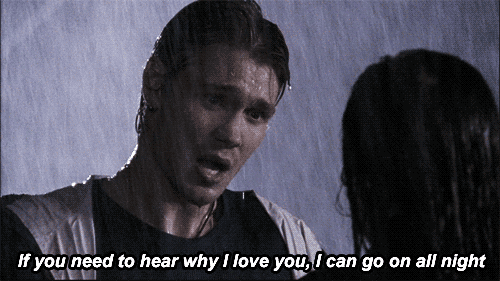Women can’t control their emotions. When we start dating someone, we go all in ASAP. We wear our hearts on our sleeves. Or, do we?
While it’s certainly true that women tend to be more open and forthcoming with their emotions (based on the very scientific evidence of living on Earth for 20+ years), science shows that men might actually fall in love faster—or at least they’re more likely to say it.

A study from the University of Pennsylvania surveyed almost 200 students and found that, while the perception is that women play fast and loose with their emotions in romantic entanglements, it’s actually men who are more likely to dive into romance headfirst. Social science researchers Marissa Harrison and Jennifer Shortall discovered that (on average) heterosexual men are willing to say those three little words to their partners far before their female counterparts and were much more likely to report to researchers that they were in love.
These findings, of course, fly in the face of long assumed cultural stereotypes around emotional investment in romantic relationships, but Harrison and Shortall think that they make perfect sense from an evolutionary standpoint. “I think women unconsciously postpone love compared to men. Women have a lot more to lose reproductively by committing to the wrong man. They are born with a finite number of eggs, yet men produce millions of sperm on a daily basis. If women commit to and get pregnant by an unworthy mate [with] no help rearing a child, that would be very costly, time- and resource-wise,” Harrison explained according to Broadly.
While it seems wrong to reduce modern romantic behaviors to base survival urges, there is something to be said for looking at interpersonal (and especially romantic) relationships through an evolutionary lens sometimes. Sure, the “biological differences” approach to the gender binary has long been infuriating to feminists, but at the end of the day we are animals and biological needs do, sometimes, shed light onto human behavior. That said, separating what is a “biological imperative” from a “socially engrained norm” is easier said than done.
Another explanation for the now-proven tendency of men to say they’re in love first? The vulnerability of it all. The Broadly article explains that psychologist Neil Lamont posits that the tendency of women to be “more risk-averse,” could also play a part in straight women’s unwillingness to go all-in on a romance without their partner taking some sort of lead. The jury is still out on whether this risk avoidance in an evolutionary advantage or a cultural expectation, but I think it’s safe to say it’s a little bit of both. Because of the widely held perception that women are more emotionally inclined while men are more distant and unwilling to commit, ladies tend to be a bit less forthcoming in the early stages of a relationship until we get the positive affirmation that we need to be certain that the guy we are with is completely “in it.”
Lamont also suggests that it’s possible that the entire phenomenon could based around social constructs, indicating that the perception that men are “supposed to be” the more dominant partner in heterosexual couplings, which also makes sense, especially in conjunction with the above assumption that men are more willing to take risks and be okay with not “getting it right” the first time. If we assume that female partners think that their men should be the leader of a relationship, then the logical extension is that expressing deep emotions would feel risky to women until the man has taken a firm lead—and that the average man might be turned off by a woman subverting that dynamic (which honestly explains all of the “crazy ex-girlfriend” stories that tend to come after admissions of love, or even “like,” from women… Ain’t it wild that the second a “supposed-to-be-emotional” woman expresses emotions, she becomes crazy?).

The researchers did add one semi-depressing caveat if you were looking here to feel better about your relationship status: just because men fall in love faster, doesn’t mean the the “love” will last. London-based psychologist Ingrid Collins explained that while her male patients were more likely to get excited about a new romance, they were also more likely to “look around.” The indication? Saying “I love you” might mean a little less to straight men than to their partners… Which might also explain why they’re more willing to say it. If loving someone doesn’t necessarily mean that you intend to be in the relationship for the long-haul, why not say it?
So, what can we learn about all of this? The biggest takeaway (and probably what you came her for) is that, yes, if your new boo seems into you, then he probably is—straight men aren’t as emotionally distant as society wants us to think. But something else to consider here is the effect of these perceptions on our dating habits.
I’m not a scientist and I’m not a psychologist, but I’d like to think that I know a fair bit about how society views heterosexual love and romance nowadays… And, although we’re moving towards a more open view of what men and women are “supposed to do” in a relationship, the way that we think our partners should act only complicates the already complex journey of navigating romance.
So, yes, this study does add one more stereotype to add to the mix, but what it really teaches us is something else entirely. The fact that men might be a little more willing to fall in love than cultural stereotypes would have us think is certainly interesting, but the most important thing to draw from this study is that our perceptions about the differences between men and women in relationships aren’t always based in fact and that our tendency to buy into those stereotypes rather than seeing our partners as complex people actually hurts us all.
AKA, this goes for all of us:

Original by: Hannah Briggs
